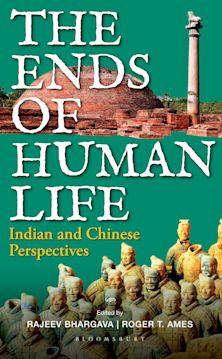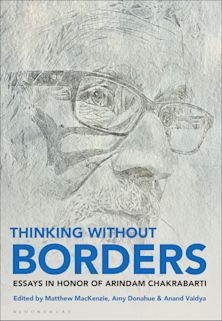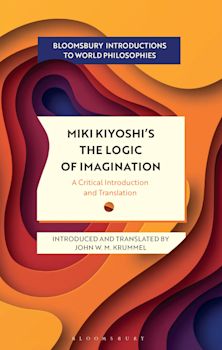- Home
- ACADEMIC
- Philosophy
- Indian Philosophy
- Philosophy of the Bhagavad Gita
Philosophy of the Bhagavad Gita
A Contemporary Introduction
- Textbook
Philosophy of the Bhagavad Gita
A Contemporary Introduction
- Textbook
Inspection copy added to basket
Choose your preferred format. If you would prefer an ebook and it is not displayed below, please visit our inspection copies page.
Please note ebook inspection copies are fulfilled by VitalSource™.
Buy from Bloomsbury eTextBooks
You are now leaving the Bloomsbury Publishing website. Your eBook purchase will be with our partner https://www.vitalsource.com.
Your credit card statement will show this purchase originating from VitalSource Technologies. They will also provide any technical assistance you might require.
You must sign in to add this item to your wishlist. Please sign in or create an account
Description
Philosophy of The Bhagavad Gita: A Contemporary Introduction presents a complete philosophical guide and new translation of the most celebrated text of Hinduism.
While usually treated as mystical and religious poetry, this new translation focuses on the philosophy underpinning the story of a battle between two sets of cousins of the Aryan clan. Designed for use in the classroom, this lively and readable translation:
- Situates the text in its philosophical and cultural contexts
- Features summaries and chapter analyses and questions at the opening and end of each of the eighteen chapters encouraging further study
- Highlights points of comparison and overlap between Indian and Western philosophical concepts and themes such as just war, care ethics, integrity and authenticity
- Includes a glossary allowing the reader to determine the meaning of central concepts
Written with clarity and without presupposing any prior knowledge of Hinduism, Philosophy of the Bhagavad Gita: A Contemporary Introduction reveals the importance and value of reading the Gita philosophically.
Table of Contents
How to Use This Book
Introduction
1. Arjuna's Sorrow
2. The Yoga of Knowledge (And Philosophy)
3. The Yoga of Action
4. The Yoga of Renunciation of Action Through Knowledge
5. The Yoga of Renunciation
6. The Yoga of Meditation
7. The Yoga of Knowledge and Judgment
8. The Yoga of the Imperishable Brahman
9. The Yoga of Sovereign Science and Sovereign Secret
10. The Yoga of Divine Manifestations
11. The Yoga of the Vision of the Cosmic Form
12. The Yoga of Devotion
13. The Yoga of Difference between the Field and the Field-Knower
14. The Yoga of the Division of Three Gunas
15. The Yoga of the Supreme Purusha
16. The Yoga of the Division between the Divine and the Demoniacal
17. The Yoga of the Threefold Faith
18. The Yoga of Liberation and Renunciation
Glossary
Bibliography
Index
Product details

| Published | 22 Mar 2018 |
|---|---|
| Format | Ebook (PDF) |
| Edition | 1st |
| Extent | 208 |
| ISBN | 9781350040168 |
| Imprint | Bloomsbury Academic |
| Publisher | Bloomsbury Publishing |
About the contributors
Reviews
-
In her lucid and student-friendly translation of the Bhagavad Gita, Maitra has uniquely and cogently reclaimed the centrality of the yoga of knowledge alongside karma and devotion through her astute philosophical eye. The introduction exemplifies Maitra's sharply refined ability to tack gracefully between South Asian and Eurocentric philosophical and ethical concepts in a finely woven integrative approach that allows students to engage this transglobal text with clarity. The “philosopher's corner” feature at the end of each chapter challenges students to query culturally diverse interpretations of agency, logic, ethics, and epistemology, making this translation my new top choice for pedagogical use.
Katherine C. Zubko, Associate Professor of Religious Studies, University of North Carolina Asheville, USA.
-
This may well become the standard translation for teaching the Bhagavad Gita in philosophy courses. Maitra has done an admirable job of balancing the demands for readability and fidelity to the original text. Her Introduction is excellent, striking an ideal balance between scholarly rigour and accessibility for an undergraduate audience. The discussions of the context and the philosophy of the Gita will prepare students well for their first reading of the text. The chapter introductions and “Philosopher's Corners” will help students and instructors alike to appreciate the philosophical depth that lurks beneath the poetic surface of the Bhagavad Gita.
Jeremy Henkel, Assistant Professor of Philosophy Wofford College, USA
-
Maitra deserves much praise for a translation that will be widely appealing to a reader at any level of familiarity with the BG or its yogic dialogues. Her willingness to engage the text's visionary potential ... and its philosophical underpinnings ... takes rare skill and a keen awareness of textual nuances.
Reading Religion
-
The book is a valuable contribution not just for the teacher and her student in a classroom, but for anyone who seeks a simple introduction to this ancient text.
Religions of South Asia
-
Professor Maitra's edition of the Bhagavad Gita is a welcome and valuable contribution to our field, as it both invites and enables her readers to engage the text in light of enduring philosophical questions. Her Introduction is tremendously useful in situating the text in its historical and conceptual contexts. Further, she provides a translation that is at once evocative and philosophically precise - and is supported by a helpful glossary. We are fortunate to now have access to a volume that so effectively makes this philosophically rich text accessible to students, general readers, and academics alike!
Elizabeth Schiltz, Associate Professor of Philosophy and Chair of East-West Philosophy, College of Wooster, USA
-
True to a text structured by questions and answers, this edition engages in a living dialogue with the Bhagavad-Gita. Maitra highlights essential philosophical questions and approaches in a vibrantly comparative way, illuminating the applied nature of the philosophy throughout. The didactic and devotional, social and literary strands are identified to enable us to see more clearly the complex coherent fabric of the text. A masterful achievement.
Brian S. Hook, Director of Humanities, Professor of Classics University of North Carolina, Asheville USA

ONLINE RESOURCES
Bloomsbury Collections
This book is available on Bloomsbury Collections where your library has access.


































